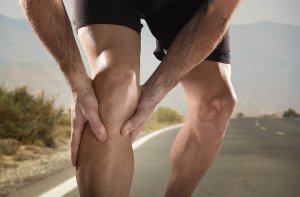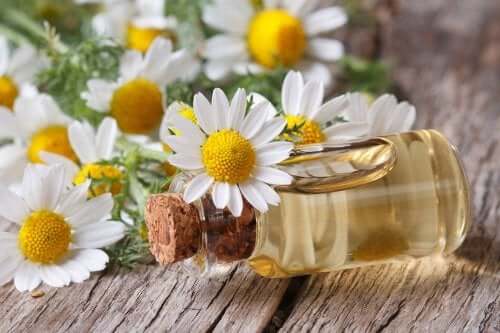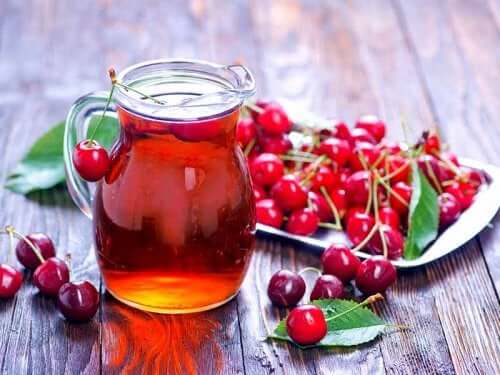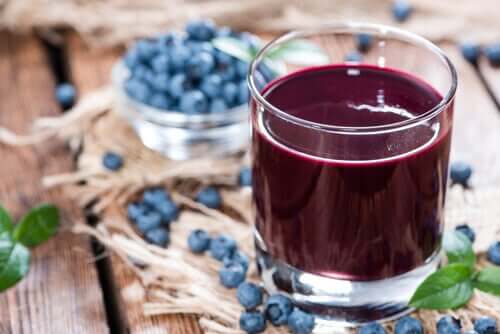5 Remedies To Avoid Muscle Cramps

Do you want to naturally avoid muscle cramps?
Cramps are caused when one or several muscles contract suddenly and involuntarily. They often affect different muscle groups, causing pain, pins and needles, and other uncomfortable feelings.
The most affected parts are usually the lower part of the leg and calve muscles. However, you can also get a cramp in your abdominal wall and in your upper extremities. The symptoms can last a few seconds, but sometimes they can last for up to 15 minutes.
Natural remedies to avoid muscle cramps
There are many factors related to muscle cramps. However, their main causes include muscle fatigue, dehydration, or imbalances in the level of electrolytes in your body.
Fortunately, there are several remedies you can use to avoid muscle cramps and their symptoms. Try them out!
1. Chamomile oil

Chamomile is a plant with many different health effects. Thanks to the more than 36 flavonoids it provides, it’s an anti-inflammatory oil that can help you avoid muscle cramps.
How to use it:
- First, combine some chamomile oil with coconut or olive oil.
- Then, massage it into the cramped muscles.
- Do this for 3 to 5 minutes and then rest.
However, there aren’t any scientific articles that have shown the effects of this treatment. It’s a remedy based on popular knowledge, and it’s unknown exactly how effective it is.
That being said, remember that the best way to get rid of cramps is with proper prevention. You can do this by hydrating and adequately replacing minerals, as is evidenced in a study published by the Journal of Sport Rehabilitation.
Discover: 6 things that might be causing muscle cramps
2. Take magnesium supplements to avoid muscle cramps
When you have recurring muscle cramps, the best thing to do is make sure you’re getting enough magnesium from your diet. This essential mineral plays a very important role in the function of your muscles and nerves. Because of this, a deficiency can influence muscle cramps.
What should you do?
- Take a magnesium supplement before exercising.
- Make sure to eat foods like plantains, bananas, almonds, legumes, and brown rice, which have a high magnesium content.
3. Cherry juice

Drinking cherry juice can help you avoid muscle cramps after doing high impact physical activity. In fact, studies have shown that drinking it can minimize pain after a race. Its antioxidant and anti-inflammatory properties help to relax your muscles.
How to use it:
- Drink a glass of cherry juice after doing exercise or other high demand physical activities.
- Drink it once a day if you suffer from cramps regularly.
4. Use cayenne pepper to avoid muscle cramps
Cayenne pepper contains an active substance known as capsaicin, which acts as a muscle relaxant. In fact, this substance helps to reduce joint pain as well. For that reason, we recommend it as a remedy to reduce pain from muscle cramps. However, we should note that it’s more than just a preventive measure, it’s also possibly a remedy to treat pain.
How to use it:
- You can add cayenne pepper to foods like soups, stews, or meats.
- You can also make a tea by adding a pinch of cayenne to hot water.
- Finally, to relax your muscles, you can massage them with cayenne pepper oil or cream.
Don’t miss this: Tips to Reduce and Prevent Muscle Cramps
5. Blueberry juice

Another healthy drink to avoid muscle cramps and pain is blueberry juice. Its essential nutrients help to regulate electrolyte levels and combat inflammation.
How to use it:
- Prepare a glass of blueberry juice and drink it before and after doing high-impact exercise.
- You can also drink it in the mid-afternoon to avoid cramps at night.
When should you see a doctor?
Cases of light muscle cramps don’t need medical attention, since they happen sporadically, with symptoms that reduce in a matter of minutes. However, in some cases the problem becomes chronic, happening constantly and intensely.
If that’s the case, it’s important to seek professional help, since sometimes it’s a symptom of an underlying condition. The doctor may suggest tests like a blood analysis, electromyography, or myelography to determine if the cramps are associated with muscular anomalies that require further attention
Watch your diet to prevent muscle cramps
You can try some natural remedies to avoid muscle cramps. However, you should complement these methods with regular exercise and a healthy diet. Additionally, you should drink plenty of water to make sure your body is hydrated.
Finally, if your symptoms are very intense or happen too often, the best thing you can do is to see a doctor. Although it doesn’t always indicate something serious, there could be an underlying cause that needs other treatments.
All cited sources were thoroughly reviewed by our team to ensure their quality, reliability, currency, and validity. The bibliography of this article was considered reliable and of academic or scientific accuracy.
- Murray D., Miller KC., Edwards JE., Does a reduction in serum sodium concentration or serum potassium concentration increase the prevalence of exercise associated muscle cramps? J Sport Rehabil, 2016. 25 (3): 301-4.
- Chen HY., Cheng FC., Pan HC., Hsu JC., Wang MF., Magnesium enhances exercise performance via increasing glucose availability in the blood, muscle, and brain during exercise. PLoS One, 2014.
- Kuehl KS., Perrier ET., Elliot DL., Chesnutt JC., Efficacy of tart cherry juice in reducing muscle pain during running: a randomized controlled trial. J Int Soc Sports Nutr, 2010.
This text is provided for informational purposes only and does not replace consultation with a professional. If in doubt, consult your specialist.








